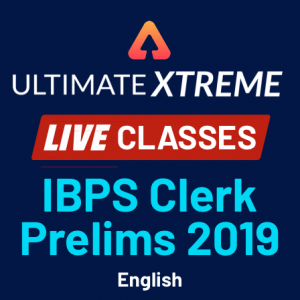Table of Contents
IBPS Clerk Prelims English Quiz
The English language perplexes most of the students and makes one nervous during the examination even if the answer to the question is known. But there are no formulas to cramp or the longer the calculation to deal with. The mistakes that occur are because of the lack of confidence. With proper strategy, Study Notes, Quizzes, Vocabulary one can calm his/her nerves and excel in no time. Make the reading newspaper, editorial a habit, and also participate in the daily quiz. The IBPS Clerk 2019 is just one step away from your reach. Here is the quiz under the Study Plan ‘FATEH’, on the IBPS Clerk Prelims English Quiz and we have an Error Detection for 20th of November 2019. You can also check out the latest books for IBPS Clerk 2019 exam.
Directions (1-15): Which of the phrase/ word from the options (a), (b), (c) and (d) given below each sentence should replace the phrase printed in bold letters to make the sentence grammatically correct? If the sentence is correct as it is, mark (e) i.e., “No correction required” as the answer.
Q1. I advised my son to engage two coolies instead of one because the luggage was too much heavy for a single coolie.
(a) the luggage was much too heavy for
(b) the luggage was too much heavy to
(c) the luggage was too heavier for
(d) the luggage was heavier for
(e) No improvement required
Q2. Sheila Chandra began her concert by chanting Om turning it finally into an experience close with prayer.
(a) to an experience close with prayer
(b) into an experience close to prayer
(c) into an experience closing by prayer
(d) to an experience closed by prayer
(e) No improvement required
Q3. Simplest solution than this expensive method which you are suggesting should be found out.
(a) Simpler solution than this expensive
(b) The simplest solution than this expensive
(c) A simpler solution than this expensive
(d) A simplest solution than this expensive
(e) No improvement required
Q4. The two leaders had taken an unreserved common position on terrorism, and the joint statement released after the meeting has pledged enhanced India-US cooperation in the Indo-Pacific region.
(a) The two leaders take an unreserved
(b) The two leaders has taken an unreserved
(c) The two leaders took an unreserved
(d) The two leaders have taken an unreserved
(e) No improvement required
Q5. Trump extracted his pound of flesh by insisting on a “fair” and “balanced” trade relationship between the two nations, indicating a mercantilist approach that can in the end limit trade and therefore prosperity in both nations.
(a) indicates a mercantilist approach which can
(b) indicating a mercantilist approach which can
(c) that indicates a mercantilist approach that can
(d) indicating the mercantilist approach which could
(e) No improvement required
Directions (6-15): Read each sentence to find out if there is any grammatical error or idiomatic error in it. The error, if any, will be in one part of the sentence. The number of part is the answer. If there is no error, the answer is (e).
Q6. When two-vowel (1)/ sounds occurs in direct succession, (2)/ the transition between them (3)/ is often difficult to make. (4)/ No error (5)
(a) 1
(b) 2
(c) 3
(d) 4
(e) No Error
Q7. My father does (1)/ not mind to be (2)/ disturbed while he (3)/ is reading the newspaper. (4)/ No error (5)
(a) 1
(b) 2
(c) 3
(d) 4
(e) No Error
Q8. The whole nation is (1)/ being painted red with (2)/ the JNU crisis as if it (3)/ is a bread-and-butter issue. (4)/ No error (5)
(a) 1
(b) 2
(c) 3
(d) 4
(e) No Error
Q9. Everybody know (1)/ that his failure can (2)/ be attributed only (3)/ to his lack of practice. (4)/ No error (5)
(a) 1
(b) 2
(c) 3
(d) 4
(e) No Error
Q10. You must warn him (1)/ saying that you (2)/ would beat him if (3)/ he is talking against you again. (4)/ No error (5)
(a) 1
(b) 2
(c) 3
(d) 4
(e) No Error
Q11. Teena wanted to (1)/ become a doctor (2)/ and worked very hardly (3)/ to achieve this. (4)/ No error (5)
(a) 1
(b) 2
(c) 3
(d) 4
(e) No Error
Q12. The significance (1)/of the detection of (2)/ gravitational waves (3)/ should not be lost on us. (4)/ No error (5)
(a) 1
(b) 2
(c) 3
(d) 4
(e) No Error
Q13. Despite of their best efforts (1)/ they failed to retain (2)/ the contract due to (3)/ unwanted political interference. (4)/ No error (5)
(a) 1
(b) 2
(c) 3
(d) 4
(e) No Error
Q14. When he had been (1)/ walked along the road (2)/ a wild and ferocious dog (3)/ hit him hard and knocked him down. (4)/ No error (5)
(a) 1
(b) 2
(c) 3
(d) 4
(e) No Error
Q15. One has to have a (1)/good political network (2)/if he or she wants (3)/ to be honored. (4)/ No error.
(a) 1
(b) 2
(c) 3
(d) 4
(e) No Error
Solutions
S1. Ans. (a)
Sol. ‘too much + noun’ is used, whereas ‘much too +adjective/adverb’ is used. In the sentence in place of ‘too much’, ‘much too’ will be used.
S2. Ans. (b)
Sol. ‘close to’ somebody/something is used.
S3. Ans. (c)
Sol. The sentence is in a comparative degree. Hence in place of ‘simplest solution’, ‘A simpler solution’ is used.
S4. Ans. (d)
Sol. As verb is in the conditional perfect which requires an auxilliary (‘having’ in this case,) therefore the past participle (taken) is necessary.
S5. Ans. (b)
Sol. ‘which’ is used for non-defining clauses, additional information whereas ‘that’ is used for defining clauses.
S6. Ans. (b)
Sol. Replace ‘occurs’ with ‘occur’. Here the subject (when two vowel sounds) is plural. Hence, it will take a plural verb.
S7. Ans. (b)
Sol. ‘Gerund’ will come after ‘mind’. Change ‘be’ into ‘being’.
S8. Ans. (e)
Sol. No error.
S9. Ans. (a)
Sol. ‘Everybody’ is a singular noun. Hence the correct verb should be ‘knows’, not ‘know’.
S10. Ans. (d)
Sol. A conditional clause starting with ‘if’ should normally be in present indefinite tense. Therefore ‘talking against’ should be replaced with ‘talks against’.
S11. Ans. (c)
Sol. Replace ‘hardly’ with ‘hard’ because ‘hard’ means a ‘tough work’, ‘hardly’ means ‘rarely’ or ‘not very often’.
S12. Ans. (e)
Sol. No error.
S13. Ans. (a)
Sol. Delete ‘of’ after ‘despite’. The word ‘despite’ takes no preposition. We use either ‘despite’ or ‘in spite of’. We never use ‘of’ after ‘despite’.
S14. Ans. (b)
Sol. Replace ‘walked’ with ‘walking’. The structure of past perfect continuous is – Subject + had been + V4 (verb + ing)
S15. Ans. (e)
Sol. No error
- Tips and Tricks To Solve Cloze Test Questions For Bank and Other Competitive Exams
- Conjunctions: English Language Notes for Bank and Other Competitive Exams




 English Language Quiz For Bank Foundatio...
English Language Quiz For Bank Foundatio...
 English Language Quiz For SBI Clerk Prel...
English Language Quiz For SBI Clerk Prel...
 English Language Quiz For SBI Clerk Prel...
English Language Quiz For SBI Clerk Prel...







